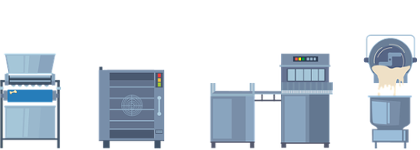Companies
Carrefour Expands Blockchain-Enabled Supply Chain Testing To Include Tomatoes
Carrefour is expanding its blockchain trial to include Filiere Qualite-branded Cauralina coer de boeuf tomatoes. According to the French retailer, the move is aimed at ensuring the transparency and traceability of its food supply chain. Carrefour has partnered with tomato supplier Les Paysans de Rougeline to support what it describes as “local, innovative and sustainable agriculture.” Blockchain technology allows the creation of a secure digital database, ensuring the integrity of information submitted or changed by users.
Innovations
Blockchain’s Innovative Features Whet Restaurants’ Appetite For Safety And Openness
Restaurant companies are trying blockchain applications to manage their various operations, including customer loyalty programs and supply chains. For example, Chanticleer Holdings uses blockchain, which is a digital, peer-to-peer technology designed to store encrypted data and protect it from fraud, to manage its loyalty program. With blockchain, the company is letting customers earn points and rewards across its restaurant brands. Closely linked to the cryptocurrency bitcoin, blockchain lets users share and access data through a decentralized system that is both open and anonymous. However, developers can add safeguards and safety parameters to the technology.
Chipotle Looks At Technology To Revive Sales Hammered By Outbreak
Chipotle is using technology to recover from a sales slump caused by an E. coli outbreak. One of the restaurant chain’s locations in New York City has functioned as a test site for many of the innovations Chipotle has implemented. According to the company, one of the biggest changes involved the company’s mobile ordering. Previously, customers have complained that its mobile ordering was confusing and came with wait times that could be as long as 45 minutes. Chipotle is using bold signs to help lead customers to mobile pick-up shelves and has reduced wait time to 12 minutes. Mobile orders account for 8.8 percent of sales, an increase of 40 percent from 2016 to 2017.
Coffee Company Uses Blockchain Technology To Return Some Of The Purchase Price To Farmers
Olam’s Technology Empowers Farmers, Gives Them Real-Time Access To Information
Commodities company Olam’s Olam Farmer Information System is helping farmers innovate and increase their production. For example, Olam’s technology puts farmers, such as Ghana cocoa farmer Muhammed Adams, in touch with agricultural experts. From them, Adams learned that he did not have to use pesticides when he had an outbreak of disease. To make customized recommendations to farmers, the OFIS app gathers farm data and uses algorithms. Also, Olam apps let farmers monitor products when leaving the farm and enable them to check product prices and trade online.
SMC Nutrition Uses Blockchain Service To Offer Supply Chain Transparency And Prevent Food Fraud
Singapore-based food company SMC Nutrition is using a distributed ledger, which is hosted on a blockchain-based service developed by security services provider Certis Group. Designed to provide business partners and consumers access to information about the company’s supply chain, the system lets consumers see the information by scanning QR codes found on the food company’s products. According to Fuji Foo, VP for business digitization, the system is fraud-proof because only suppliers and distributors are granted control and access to the information.
Technological Advances Disrupt Meat Industry, Prompt Industry Leaders To Adapt
Digital disruption, the process by which technological changes are forcing businesses worldwide to re-invent their operations and products, is also affecting the meat industry. Recent steps taken by industry leaders Cargill and Tyson Foods, Inc., are providing a clear insight on how digital innovations are upending the market. For example, Cargill has disposed of its 153-year-old business model to become a “modern, flexible, integrated food company.” For its part, Tyson launched its Tyson Ventures investment arm, which has invested in laboratory-grown meat startups Beyond Meat and Memphis Meats. Also, technology is transforming the industry’s supply chain into a “shortened, more transparent, completely disrupted” model.
Leading Brands Employ Blockchain To Get Most Value From Online Advertising
Leading brands, including Anheuser-Busch InBev, AT&T Inc., and Kellogg Co., are adopting blockchain technology to ensure that their online advertising is viewed by real people and not by computer-generated bots. Also, these major brands seek to use the technology to determine how much of their ad spending goes to middlemen. Designed as a “secure digital database” that can host a “record book” of transactions, blockchain lets business partners to maintain a record of their dealings and transactions. These data cannot be edited.
Market News
Blockchain Works To Improve Food Safety, Benefits Farmers
Blockchain technology has some positive impact on farming and the food industry. By integrating blockchain into the food industry’s supply chain, food safety scares can be easily detected, and their origin determined. Blockchain can also help prevent food fraud by making it easier to identify ingredients of finished products. Also, by removing paper-based processes and middlemen from the process, bitcoin can help lower food prices while improving farmers’ income.
India’s Kerala State Taps Blockchain, IoT To Upgrade Food Supply Chain
In India, the state of Kerala is planning to use a combination of blockchain technology and the Internet of Things to improve its food supply, including milk, vegetable, and fish. Being implemented through the state’s Kerala Development and Innovation Strategic Council, the program aims to use separate ID tags for each food shipment to keep track of food products across the supply chain. To ensure fast and reliable delivery and prevent food waste, each part of the supply chain will include radio frequency identification or RFID tags integrated with mobile apps.
Regulation
FSA Tests Blockchain As Regulatory Tool, Completes Pilot In Slaughterhouse
UK’s Food Standard Agency has completed a trial program involving the use of blockchain technology as a regulatory tool in a cattle slaughterhouse. Aimed at improving transparency in the food supply chain, the pilot allowed both FSA staff and the slaughterhouse to access data. According to the FSA, the agency will implement the same program in other food production plants.

